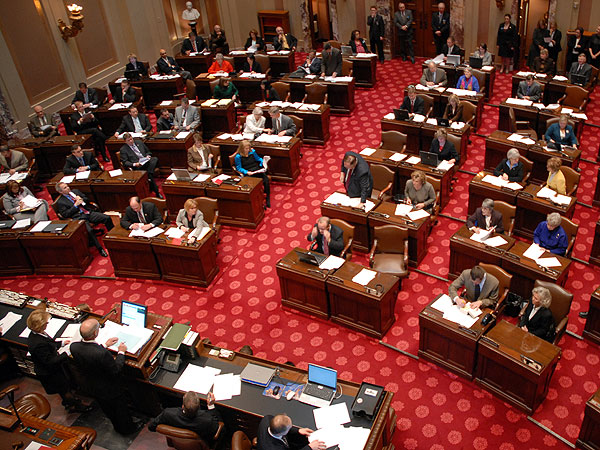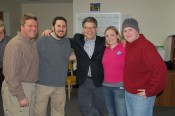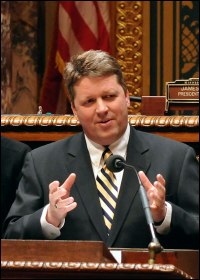Voter ID
 After speaking at a Chamber of Commerce luncheon in LeCenter a few days ago, I had a discussion with a woman about voting and voter identification. Our conversation followed an earlier comment by a gentleman who felt the recent MN U.S. Senate race and subsequent recount made us a “national laughingstock.” I respectfully disagreed with the lady and the gentleman.
After speaking at a Chamber of Commerce luncheon in LeCenter a few days ago, I had a discussion with a woman about voting and voter identification. Our conversation followed an earlier comment by a gentleman who felt the recent MN U.S. Senate race and subsequent recount made us a “national laughingstock.” I respectfully disagreed with the lady and the gentleman.
The United States, throughout its 233 years, has a history of restricting voters. Originally, land owning white males were the only people showing up at the polls on Election Day. Gradually, these restrictions were lifted. No less than 6 constitutional amendments have extended voting rights to women, minorities, 18 year olds, and residents of the District of Columbia. The Voting Rights Act of 1965 put teeth into earlier amendments ensuring eligible citizens could exercise their rights and cast their vote on Election Day.
The woman was emphatic about the need for a photo ID to vote: “Well, you have to show an ID to cash a check or buy a beer; we should require the same for voters.” I disagree. We don’t have a constitutional right to buy beer or cash a check. We do have the right to vote. And not every person has a photo ID. There is no documented wave or trend of individuals voting multiple times, voting as someone else, or voting despite knowing that they are ineligible. Indeed, evidence from the highly scrutinized 2004 gubernatorial election in Washington State actually reveals just the opposite: though voter fraud does happen, it happens approximately 0.0009% of the time. The similarly closely-analyzed 2004 election in Ohio revealed a voter fraud rate of 0.00004%. National Weather Service data shows that Americans are struck and killed by lightning about as often (Brennan Center for Justice).
The recent Franken - Coleman recount demonstrated a deliberate and thorough process that highlighted a few areas of concern. The concerns were minimal, but if addressed, could avoid any problems in future recounts. Legislation passed by the legislature this past session would have strengthened Minnesota’s election system by using state and federal databases to help prevent those who are ineligible from registering or voting before elections take place. Every effort was made during the session to pass a bipartisan election reform bill with non-controversial, common sense reforms to make our good election process better. Those reforms would have strengthened voter registration systems and made it easier to accurately and efficiently count absentee ballots. Governor Pawlenty vetoed the bill.
“I don’t care who you vote for, just as long as you vote.” I actually would say that to people on the phone during my last election campaign. The right to vote is at the core of any democracy. Perhaps I put too much trust in my community, our local election judges, or the person who vouches for their neighbor at the polling site. Even though Minnesota consistently leads the nation in voter turnout we should continue to do whatever we can to encourage even more voter participation, not set up more roadblocks.

 From now until the 2010 election, we will hear the steady drumbeat from the opposition critical of legislators and their work during the 2009 legislative session, specifically dealing with the unprecedented $6.4 budget deficit. I am okay with that. As an elected official, I understand we will be subject to criticism, right or wrong. The people’s freedom to express themselves is essential in a representative democracy.
From now until the 2010 election, we will hear the steady drumbeat from the opposition critical of legislators and their work during the 2009 legislative session, specifically dealing with the unprecedented $6.4 budget deficit. I am okay with that. As an elected official, I understand we will be subject to criticism, right or wrong. The people’s freedom to express themselves is essential in a representative democracy. Yesterday, I had the opportunity to meet with over nearly 50 people on a family farm south of Montgomery. These family farmers expressed real concerns about staying in business and their ability to make a living as dairy farmers. They are typical of the more than 60,000 dairy farms in the United States that have been cutting costs, selling off their cows, or leaving the dairy business altogether as milk prices plummet while dairy farm operating costs remain uncomfortably high.
Yesterday, I had the opportunity to meet with over nearly 50 people on a family farm south of Montgomery. These family farmers expressed real concerns about staying in business and their ability to make a living as dairy farmers. They are typical of the more than 60,000 dairy farms in the United States that have been cutting costs, selling off their cows, or leaving the dairy business altogether as milk prices plummet while dairy farm operating costs remain uncomfortably high. During Jimmy Carter’s term in office, the 39th president expressed concerns about the complacency of the American public. Not surprising, considering America was not far removed from the conflict in Vietnam and the Watergate scandal. At the end of his term, the country was experiencing high unemployment, an energy shortage, inflation, and of course the Iran hostage Crisis.
During Jimmy Carter’s term in office, the 39th president expressed concerns about the complacency of the American public. Not surprising, considering America was not far removed from the conflict in Vietnam and the Watergate scandal. At the end of his term, the country was experiencing high unemployment, an energy shortage, inflation, and of course the Iran hostage Crisis. The thermometer indicated 5 degrees below zero, January 2, 2008. Al Franken and I were out door knocking in Northfield on the eve of my special election. Al is determined. After he knocks, a few seconds later he opens the door and asks, “Is anyone home?” Any signs of annoyance at being interrupted at dinnertime quickly dissipate when constituents realize Al Franken is standing in the foyer. Smiles exchange handshakes as Al and I remind voters to vote the next day. We turn around and head into the cold night air, ready to surprise the next potential voter followed with a thoughtful reminder of the importance of voting.
The thermometer indicated 5 degrees below zero, January 2, 2008. Al Franken and I were out door knocking in Northfield on the eve of my special election. Al is determined. After he knocks, a few seconds later he opens the door and asks, “Is anyone home?” Any signs of annoyance at being interrupted at dinnertime quickly dissipate when constituents realize Al Franken is standing in the foyer. Smiles exchange handshakes as Al and I remind voters to vote the next day. We turn around and head into the cold night air, ready to surprise the next potential voter followed with a thoughtful reminder of the importance of voting.
